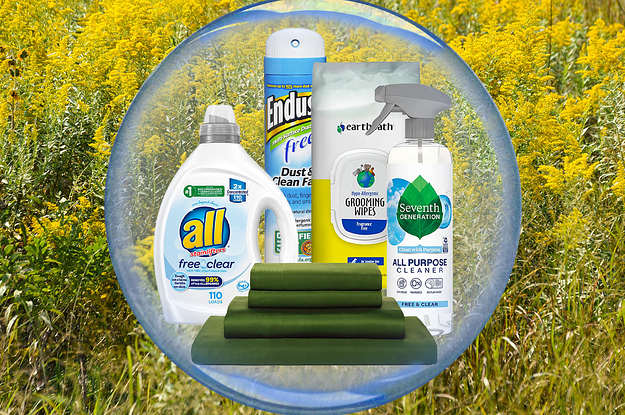These Products Can Help Ease Seasonal Allergy Symptoms
BuzzFeed may collect a share of sales or other compensation from the links on this page if you decide to shop from them. All products were independently selected by our editors, and the prices were accurate and items in stock at the time of publication.
In general, spring is wonderful. In many parts of the country, people emerge from their winter hibernation en masse to see the sun shining and the flowers blooming. But this year more than ever before, it feels like lots of those people are sneezing.
Or at least, I am sneezing. My eyes are puffy and watering. I had to use so many tissues last week that the skin on my nose was raw and peeling. I almost, ALMOST didn’t want to go outside on a bright, almost 70-degree day because I was struggling so much inside and couldn’t handle exposing myself to more potential allergens.
While my spring and fall allergy symptoms have definitely gotten worse with age, I’d never experienced anything to this extent. Almost everyone I complained to seemed to commiserate, though, which led me to believe that I wasn’t alone in this newly extreme reaction. And it wasn’t just people in New York, where I live — I’d heard it from people who lived in many different places.
Not only was I confused as to why things seemed to escalate this year, but I also needed to know what we (I) could do to feel better, stat.
Are allergies worse this year?
According to Kenneth Mendez, CEO and president of the Asthma and Allergy Foundation of America (AAFA), the allergy season is indeed getting longer and more intense, and climate change is the culprit.
If the allergy season caught you off guard, it’s because rising temperatures have caused the growing season to start sooner. And your symptoms may last longer than you’d expect because of a delayed first frost, Mendez said. The first frost is what finally kills off the ragweed, which is the primary allergen in the fall.
“When you add to that the carbon dioxide and ozone layer from climate change, that actually acts as a stimulant or really increases the intensity of pollen release in plants, it’s a double whammy,” he said. “So your allergies certainly could be feeling like they’re getting worse, because there’s more intense releases of pollen, and a much earlier and longer growing season.”
How to manage allergy symptoms
The first piece of advice that Mendez has for anyone with allergy symptoms is to see a doctor, ideally an allergy specialist. It’s important to understand what your triggers are to find the right treatment, and there may be a prescription allergy medicine that could help.
There are also over-the-counter medications like antihistamines, decongestants, and nasal sprays that can reduce some of the symptoms. However, what you should use will vary from person to person and depend on your particular experience. He also recommends starting any allergy medication before allergy season begins because it can take a while to kick in.
Mendez recommends that you check weather reports for air quality and pollen counts and to avoid being outside during the worst times. To prevent the spread of allergens in your home it’s also a good idea to leave your shoes and coat at the door when you come inside and wipe down any pet who has been outdoors with you.
Essentially, do whatever you can to prevent the transfer of pollen, which will make your home a more comfortable space. That also means keeping windows closed, cleaning any surfaces that can hold onto allergens, washing your sheets once per week at a high temperature, and using an air purifier.







